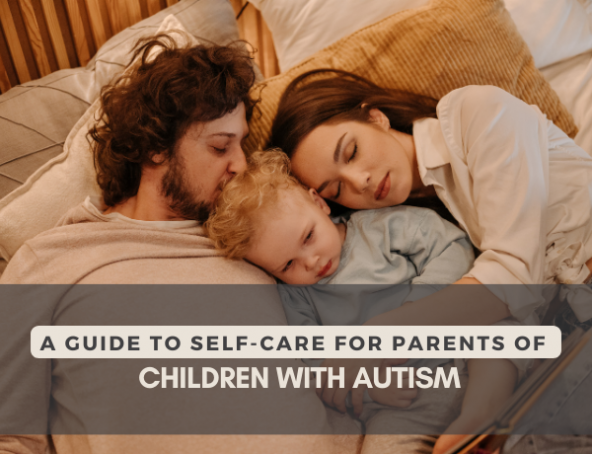A Guide to Self-Care for Parents of Children with Autism

All parents face challenges, but the unique challenges of raising an autistic child can leave many parents feeling overwhelmed. The daily routines, therapies, and unique family needs can be exhausting, leaving little time or energy for personal care. However, taking care of yourself is not a luxury—it is a necessity. When parents are well-rested, emotionally balanced, and physically healthy, they are better equipped to provide the best care for their children. This blog will highlight the necessity of self-care for parents to maintain their well-being and offer practical advice on how to incorporate self-care into daily routines. We cover various self-care strategies, including physical health, mental and emotional health, social connections, and practical daily tips. By taking small, manageable steps to care for yourself, you can improve your own quality of life and create a more supportive environment for your child.
Self-Care 101
What do we mean by “self-care”?
Self-care refers to the practices and activities individuals engage in to maintain their physical, mental, and emotional health. It encompasses everything from basic needs, such as eating well and getting enough sleep, to more personal and emotional needs, like taking time to relax, pursuing hobbies, and seeking social support.
Why is it important?
Consistent self-care can reduce stress, increase resilience, and improve overall quality of life. When you regularly take steps to care for yourself, you are better equipped to handle the challenges and demands of parenting. Self-care helps you recharge, preventing burnout and allowing you to be more present and effective in your daily responsibilities.
Common barriers to making self-care a priority
Many parents face common barriers that make self-care challenging. Lack of time is often a significant hurdle, as the demands of parenting can leave little room for personal activities. Guilt is another barrier; parents may feel selfish for prioritizing their own needs over those of their family. However, it is important to remember that taking care of yourself is essential to being able to take care of others effectively. Overcoming these barriers requires a shift in perspective and a commitment to making self-care a priority.
3 Key Areas to Focus on When it Comes to Self-Care
Area 1: Physical Health
Exercise: Regular exercise, such as morning walks or yoga, boosts endorphins and improves physical health, leading to increased energy levels and better mood regulation. Here are a couple of things to try:
- Morning Walks: Start your day with a 15-minute walk around your neighborhood. It is a simple way to get moving and clear your mind, promoting mental clarity and reducing stress.
- Yoga at Home: Use online yoga videos to practice stretching and relaxation exercises. Even 10 minutes a day can make a difference in improving flexibility, reducing muscle tension, and promoting relaxation.
Nutrition: A balanced diet supports overall health and provides sustained energy throughout the day, enhancing focus and stamina. Here are a couple of ideas:
- Meal Planning: Spend an hour on weekends planning and prepping meals for the week. This can save time during busy weekdays and ensure that nutritious meals are readily available.
- Healthy Snacks: Keep a stock of healthy snacks like nuts, fruits, and yogurt to maintain energy levels and curb cravings between meals, supporting stable blood sugar levels and sustained energy.
Sleep: Quality sleep is crucial for physical and mental rejuvenation, enhancing mood, cognition, and overall well-being. A couple of strategies that may help are:
- Sleep Schedule: Establish a consistent bedtime routine to improve sleep quality. Activities like reading a book, dimming lights, and avoiding screens before bed signal to your body that it is time to unwind and prepare for rest.
- Power Naps: If possible, take short naps (15-20 minutes) during the day to recharge. Power napscan boost alertness and productivity without interfering with nighttime sleep patterns.
Area 2: Mental and Emotional Health
Mindfulness and Meditation: Mindfulness practices and meditation reduce stress, promote relaxation, and improve emotional regulation. A few ideas of how to incorporate this self-care practice are:
- Guided Meditation Apps - Use apps like Headspace or Calm for short, guided meditation sessions to reduce stress, improve focus, and cultivate mindfulness in daily life.
- Deep Breathing Exercises - Practice deep breathing exercises, such as inhaling for four counts, holding for four counts, and exhaling for four counts. This technique activates the body's relaxation response, calming the mind and reducing anxiety.
Therapy and Counseling: Professional support provides a safe space to address challenges, develop coping strategies, and gain emotional insight. There are a few options to consider including:
- Individual Therapy - Regular sessions with a therapist can help navigate complex emotions, manage stressors, and foster personal growth in a supportive environment.
- Support Groups - Join a support group for parents of autistic children to share experiences, receive validation, and build a network of understanding peers, fostering a sense of community and emotional support.
Stress Management: Stress management techniques promote resilience, reduce burnout, and enhance overall well-being. The following ideas are techniques that have proven to be helpful:
- Journaling - Write down your thoughts and feelings to process emotions, gain clarity, and reduce stress. Journaling can serve as a therapeutic outlet for expressing and reflecting on experiences.
- Hobby Time - Dedicate time to a hobby you enjoy, such as reading, gardening, or crafting. Engaging in enjoyable activities provides a mental break, fosters creativity, and promotes relaxation.
Area 3: Social Connections
Support Groups: Connecting with others who share similar experiences provides empathy, understanding, and practical advice. There are online and in person methods of connecting:
- Local Parent Groups - Attend local meetups for parents of autistic children to share challenges, exchange resources, and build supportive relationships with peers facing similar circumstances.
- Online Communities - Join online forums or social media groups for parents to share advice, seek guidance, and receive emotional support from a virtual community of like-minded individuals.
Family and Friends: Maintaining relationships with loved ones provides emotional support, reduces feelings of isolation, and enhances overall well-being. Examples of how to maximize this resource could include:
- Regular Check-ins - Schedule regular phone calls or video chats with family and friends to stay connected, share updates, and receive emotional support.
- Social Outings - Plan occasional outings with friends or family, such as coffee dates or family picnics, to enjoy quality time together and create positive memories.
Community Resources: Accessing community resources provides practical support, respite, and opportunities for social engagement. Two examples include:
- Respite Care Services - Utilize respite care services to take a break from caregiving responsibilities, recharge, and prioritize self-care.
- Community Programs - Participate in community programs or events designed for families with autistic children to access specialized services, educational workshops, and recreational activities that promote family well-being.
What if you do not have time for Self-Care?
Incorporating self-care into your daily routine does not have to be complicated or time-consuming.
Here are 3 simple tips to help you manage your time, set boundaries, and establish a consistent self-care routine, ensuring you take care of yourself every day.
1. Time Management: Effective time management reduces stress, increases productivity, and allows for more personal time. For example:
- Prioritize Tasks - Make a daily to-do list and prioritize tasks to manage your time more effectively. This helps you focus on what is most important and ensures that essential tasks are completed first.
- Delegate Responsibilities - Share responsibilities with your partner or other family members to lighten your load. Delegating tasks can help reduce your workload and free up time for self-care activities.
2. Setting Boundaries: Setting boundaries protects your time and energy, helping you avoid burnout and maintain balance. This can be difficult at first but here are a couple of ways to begin practicing:
- Learn to Say No - Recognize your limits and do not be afraid to say no to additional responsibilities or social commitments. Saying no when necessary, can prevent you from becoming overwhelmed and allows you to focus on your priorities.
- Designate Personal Time - Set aside specific times each day for personal self-care activities. Having dedicated time for yourself ensures you regularly engage in activities that promote your well-being.
3. Self-Care Routine: Establishing a self-care routine creates consistency and ensures you regularly take time for yourself. You could incorporate a start and end of the day routine – here are two ideas:
- Morning Routine - Create a morning routine that includes time for self-care, such as a quick workout or quiet reflection. Starting your day with self-care activities can set a positive tone for the rest of the day.
- Evening Wind-Down - Develop an evening routine to help you unwind, such as reading a book, taking a warm bath, or practicing relaxation techniques. An evening routine can help you relax and improve your sleep quality.
Balancing Self-Care and Childcare
Balancing the demands of parenting with the need for self-care can often feel like a constant push-pull. It is easy to feel guilty for taking time for yourself when your child's needs seem all-consuming. However, integrating self-care into your daily routine in small, manageable steps can make a significant difference.
Some ideas of ways to blend self-care with childcare, helping you achieve a balance that benefits both you and your child, are:
1. Integration: Integrating self-care into family activities ensures you take care of yourself without feeling like you are neglecting your child's needs.
Examples:
- Family Walks - Incorporate physical activity by taking walks with your child. This promotes physical health for both of you and provides an opportunity for bonding and relaxation.
- Cooking Together - Prepare healthy meals together, making it a fun and educational activity for your child. This helps you maintain a nutritious diet while teaching your child valuable cooking skills.
2. Role Modeling: By demonstrating self-care, you teach your child the importance of looking after their own well-being, fostering lifelong healthy habits.
Examples:
- Demonstrate Healthy Habits - Show your child the importance of self-care by practicing it yourself. When they see you exercising, eating well, and managing stress, they learn to value these habits.
- Positive Attitude - Maintain a positive attitude towards self-care, teaching your child to value their own well-being. Expressing enthusiasm for activities like exercise and relaxation can inspire them to follow suit.
3. Shared Activities: Shared activities create opportunities for both you and your child to relax and enjoy quality time together, enhancing emotional bonds and reducing stress. There are many activities to share with your child but here are just a couple of ideas to get you started:
- Mindfulness Exercises - Practice simple mindfulness exercises together, such as deep breathing or guided visualization. These activities can help both of you calm your minds and stay present.
- Art and Craft Time - Engage in creative activities like drawing or crafting, which can be relaxing for both you and your child. Creativity allows for self-expression and stress relief in a fun, engaging way.
Resources and Support
Navigating the challenges of self-care while raising an autistic child can be daunting, but you do not have to do it alone. Numerous resources are available to support you on this journey. From books and articles offering practical advice to apps that facilitate mindfulness and health tracking, and professional help tailored to your specific needs, these tools can make a significant difference in maintaining your well-being.
Here are some valuable resources to help you integrate self-care into your daily life.
Books and Articles
"The Self-Care Solution" by Jennifer Ashton, M.D. - A comprehensive guide to various self-care strategies, offering insights and practical tips to improve your physical, mental, and emotional health.
"Self-Care for Moms" by Sara Robinson - Practical tips specifically for mothers balancing multiple responsibilities, providing strategies to incorporate self-care into a busy lifestyle.
Apps and Tools
Calm App - Offers guided meditations, sleep stories, and breathing exercises to help reduce stress, improve sleep, and promote mindfulness.
MyFitnessPal - Helps track diet and exercise to support physical health, making it easier to maintain a balanced diet and regular physical activity.
Professional Help
- Finding a therapist: Finding the right therapist can be a critical step in maintaining your mental and emotional well-being. Here are three tips to help you find a therapist who specializes in working with parents of autistic children:
1. Seek Recommendations: Ask for recommendations from your child’s healthcare providers, support groups, or other parents of autistic children. Personal referrals can help you find a therapist with relevant experience and a good track record.
2. Verify Credentials and Specializations: Ensure the therapist is licensed and has specific training or experience in working with families of autistic children. Look for credentials such as Licensed Clinical Social Worker (LCSW), Licensed Professional Counselor (LPC), or Licensed Marriage and Family Therapist (LMFT), and inquire about their experience with autism.
3. Conduct Initial Consultations: Schedule initial consultations with a few therapists to find one who is a good fit for you. Discuss their approach to therapy, experience with autism, and how they can support your specific needs. Finding a therapist you feel comfortable with and confident in is essential for effective therapy.
- Seeking Respite Care: Respite provides short-term care and supervision for the child to provide relief for the parents or caregivers. It may take place in the child’s home or in the community. Respite services are authorized by the Arizona Division of Developmental Disabilities (DDD). To be eligible for funding, families must be approved through Arizona Long Term Care Services (ALTCS). We have a Family Support Team at AZA that is available to assist families at no cost through the process of applying for ALTCS eligibility and requesting services through DDD.
Taking care of yourself is an essential part of being the best parent you can be for your autistic child. By integrating self-care into your daily routine, seeking support from available resources, and finding a therapist who understands your unique challenges, you can enhance your well-being and resilience. Remember, self-care is not selfish—it is necessary.
AZA United's Family Support Team provides support and guidance for families facing any number of challenges as they navigate the Autism journey. This service is available at no charge to all members of the autism and developmental disability community. You may make a phone appointment that works with your schedule by visiting azaunited.org/supportcall
You may also be interested in:
.png) <other new blog> 10 Quick Self-Care Tips for Parents of Children with Autism
<other new blog> 10 Quick Self-Care Tips for Parents of Children with Autism
For more helpful resources and information, follow AZA United on social media:

.png)


